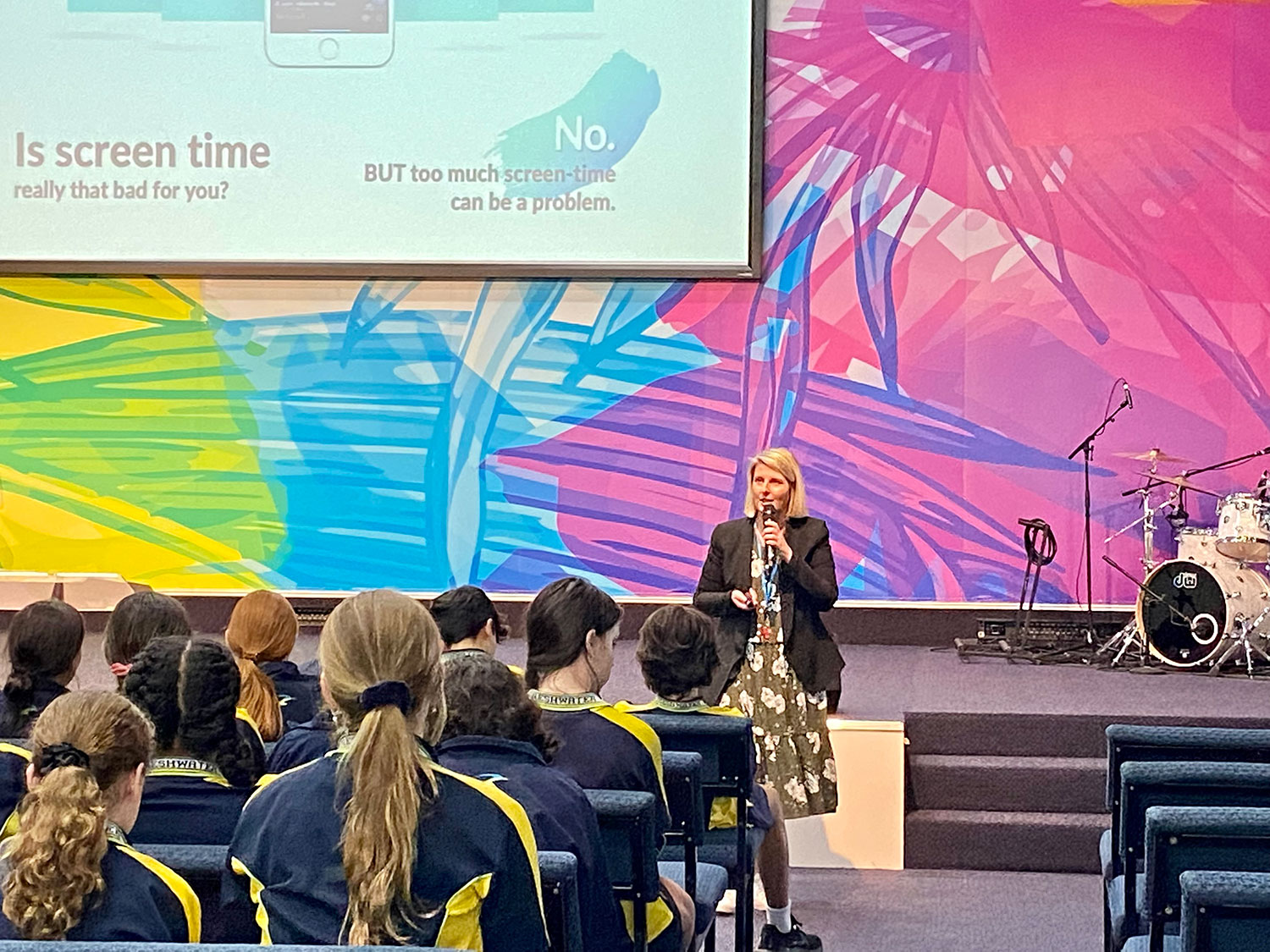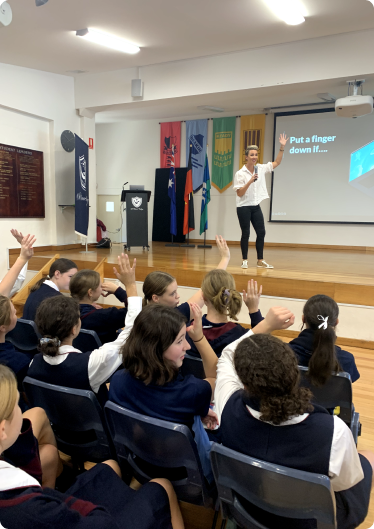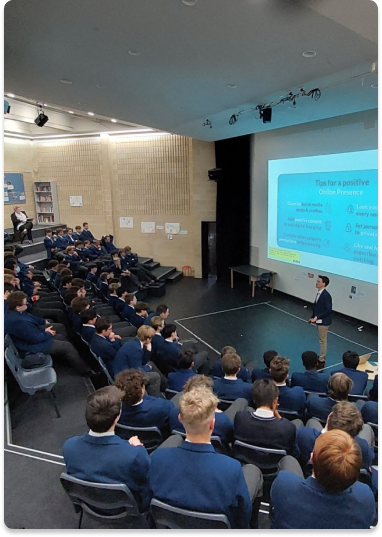Online Safety Education Sessions for Secondary Students
Developed by our award-winning team, our student education sessions are dynamic and engaging, teaching students in an interactive way how they can make cyber-smart choices.
.png?width=1058&height=887&name=ySafe%20Website%20Graphics%20(22).png)
About the Sessions
Our secondary student sessions are known for their affirmative and unique psychological spin on cyber safety.
Our goal is to empower young people to make wise choices online, to ensure they thrive in the digital world, rather than just survive.
This session didn't feel like 'mum' telling me off, but rather a friend showing me the way.
Cyber Bullying
Our sessions encourage students to change their perspectives on cyberbullying and challenge them to not only recognise but anticipate the impacts of a range of negative online behaviours, and the motivators behind them. Using a unique framework and real-life case studies, we highlight practical strategies students can use to avoid online drama.
Nudes & the Law
We explore the laws around 'sexting' and the non-consensual sharing of nudes. We discuss the broader social and emotional impacts of distribution and Image-based abuse, and provide strategies to manage inappropriate requests & peer pressure.
Online Wellbeing & Screen Time
Looking at the 'brain-hacks' and persuasive design techniques developers use to draw our attention towards technology, we explore the importance of healthy and balanced screen time management, including its impact on sleep, study and self-esteem.
Digital Footprint & Online Reputation
This content pillar explores the concept of online reputation and personal branding, and challenges students to think about others perceptions of their online behaviours and future-proofing opportunities. While exploring harm minimisation approaches, students are equipped with helpful strategies to create and optimise a positive online image.
Our secondary sessions provide practical information on preventing negative online experiences.
Designed to stand out from your typical cyber safety presentation, our sessions are visually engaging, dynamic, and interactive.
Our secondary sessions not only deliver crucial lessons in online safety but empower the next generation to consider how they can take the lead in enhancing education and behaviour within their own digital communities.
Foundation Session Overview
This session goes beyond the standard cyber safety discussion points and takes a deep dive into the complexities of the behaviours experienced by teens in online environments. Utilising case studies and scenarios to explore ways to navigate online conflict between friends and peers, the session helps students understand the common online peer group issues experienced, including social exclusion and bystander behaviour. It also covers important social and emotional considerations around sexting, peer pressure, and strategies to decline inappropriate requests. It includes techniques to optimise online wellbeing, screen time, and persuasive technology for a balanced and healthy online experience.
Key themes discussed in this session:- Cyberbullying and online conflict
- Sexting and the law
- Online wellbeing
Cyberbullying and conflict management are challenges commonly encountered online at this age. With our pro-technology ethos, we focus on educating students to manage their emotions towards others in a healthy way and provide them with proactive strategies for assessing the risks and potential outcomes of things said and done online.
This session also discusses image-based abuse and consent and assesses how this impacts our online interactions. We talk about how online behaviour can influence our 'personal brand' both positively and negatively (using case studies from both ends of the spectrum) and give the students strategies to help protect their privacy and optimise their online reputation.
Key themes discussed in this session:
- Online conflict
- Respectful relationships
- Digital footprint
These formative years can make or break a student's success outside of the school environment. In this session, we use real-life case studies to highlight the link between online activity, personal brand, and employability. We explore some of the modern technologies used to analyse and interpret online behaviour in recruitment screening and finish with practical strategies to help students enhance their personal brand online.
This session also covers sexting and image-based abuse laws, focusing on the implications for the 18+ and under 18 age categories. We discuss the link between image-based abuse and consent, using scenario analysis to encourage students to apply their understanding of consent to the context of online interactions. We talk about making meaningful connections online and explore some of the risks, including catfishing and the role that evolving technologies (such as deepfakes) play in exacerbating these risks. We finish with strategies to help students connect and converse safely online.
With online wellbeing, we explore concepts such as persuasive technology and the attention economy and consider how these techniques influence our behaviour. We discuss the impact of mobile devices and social media on our ability to work and study and provide strategies to help keep tech use productive.
Key themes discussed in this session:
- Digital footprint and employability
- Respectful relationships and connecting safely
- Online wellbeing and self-regulation
Expert speakers and in-class learning have the greatest impact.
Designed to address Australian Curriculum.
Our foundation sessions cover multiple curriculum links.
Health & Physical Education (Years 7 & 8): Practise and apply strategies to seek help for themselves or others (ACPPS072).
HASS (Year 7): Collaborate to generate alternatives in response to an issue or challenge, and compare the potential costs and benefits of each (ACHASSI160).
General Capabilities: Personal and social capability & ethical understanding.
Health & Physical Education (Year 9 and 10): Evaluate situations and propose appropriate emotional responses and then reflect on possible outcomes of different responses (ACPPS094).
Civics & Citizenship (Year 10): Account for different interpretations and points of view (ACHCS098).
English (Year 10): Understand how language use can have inclusive and exclusive social effects and can empower or disempower people (ACELA1564).
General Capabilities: Personal and social capability & ethical understanding.
Coming soon
Feedback from Students
Making an impact is important to us. We assessed the effectiveness of our programs by collecting and assessing pre & post feedback data from primary-aged students. This is what they reported.
96%
Students reported feeling less likely to cyberbully after the session
94%
Students reported they believed all students their age should receive ySafe education
84%
Of students displayed increased knowledge about safe online gaming
Freshwater Christian College, QLD
Yr 7-10

St Clare's College, NSW
Yr 8-9

Mazenod College, WA
Yr 11
